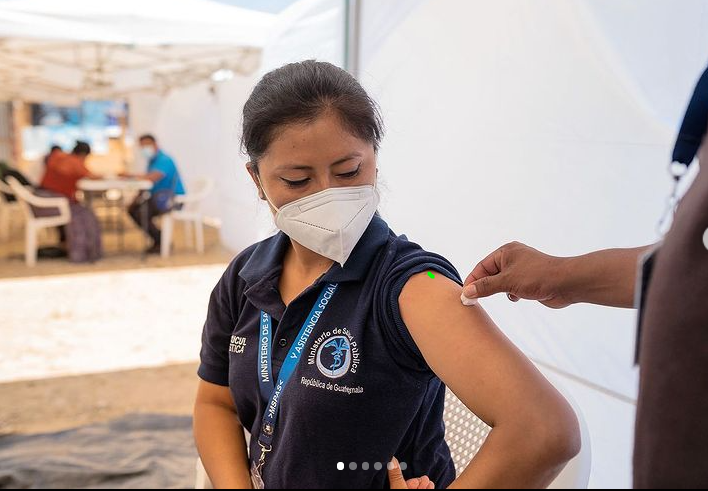International News Desk, Delhi Magazine: Thanks to their work, humanity has managed, in record time, to have not one, but several vaccines against Covid-19 . And for this reason, the Princess of Asturias Award for Technical and Scientific Research has wanted to recognize the work of Katalin Karikó , Drew Weissman , Philip Felgner , Ugur Sahin , Özlem Türeci , Derrick Rossi and Sarah Gilbert , the scientists who have made it possible for vaccines like that of Pfizer / BioNTech, AstraZeneca or Moderna have already made it possible to immunize millions of people around the world.

The jury has recognized the work of those who knew how to see, decades ago, the therapeutic potential of messenger RNA (mRNA), such as Katalin Karikó or Drew Weissman, who laid the foundations for the development of the BioNTech / Pfizer and Moderna vaccines. But also the work of Philip Felgner, whose contributions to ‘vehicle’ the introduction of mRNA was key; or the concrete investigation that later scientists like Derrick Rossi elaborated; the marriage of Ugur Sahin and Özlem Türeci [‘progenitors, respectively, of Moderna and Pfizer / BioNTech vaccines]. Finally, the jury has also distinguished Sarah Gilbert, at the helm of the adenoviral vector vaccine developed by the University of Oxford / AstraZeneca.
“The winners are protagonists of one of the most outstanding events in the history of science . Their work constitutes an excellent example of the importance of basic science for the protection of health on a global scale”, highlights the jury’s minutes.
“With their long trajectories in basic research, they have led to innovative applications such as obtaining, in an extraordinarily short time, effective vaccines to fight the COVID-19 pandemic. Both the development of novel messenger RNA technology, and the production of vaccines based on adenovirus, opens a path of hope for their use against other diseases “, adds the arguments of the jury, chaired by Pedro Miguel Echenique Landiríbar and integrated by Juan Luis Arsuaga Ferreras, César Cernuda Rego, Juan Ignacio Cirac Sasturáin , Elena García Armada, Clara Grima Ruiz, Jerónimo López Martínez, Inmaculada Martínez Rubio, Amador Menéndez Velázquez, Sir Salvador Moncada, Concepción Alicia Monje Micharet, Ginés Morata Pérez, Enrique Moreno González, Lluis Quintana Murci,Pilgrim Quintela Estévez, Inés Rodríguez Hidalgo, Manuel Toharia Cortés, María Vallet Regí and Santiago García Granda (secretary).
The winning candidacy was proposed by Peter Lawrence , 2007 Prince of Asturias Award for Scientific and Technical Research.
Forty-eight candidates from 17 nationalities were opting for the award, which is intended to recognize the “work of cultivating and improving research, discovery and / or invention in mathematics, astronomy and astrophysics, physics, chemistry, science life, medical sciences, earth and space sciences and technological sciences, as well as the disciplines corresponding to each of these fields and the techniques related to them “, according to the statutes of the Princess Foundation of Asturias.
Last year the award went to the four mathematicians whose research supported the digital age – the French Yves Meyer and Emmanuel Candès, the Belgian Ingrid Daubechies and the Australian Terence Tao.
Biochemists Emmanuelle Charpentier and Jennifer Doudna ; chemists Avelino Corma, Mark E. Davis, and Galen D. Stucky; physicists Peter Higgs and François Englert or neurologists Joseph Altman, Arturo Álvarez-Buylla and Giacomo Rizzolatti are also among the winners in previous editions.
The Investigation will be the seventh of the eight awards that the institution that bears the title of the heir to the Crown to fail each year. In this XLI edition, the International Cooperation awards have already been awarded to the NGO Campaign for Female Education (CAMFED); Arts, to the Serbian Marina Abramovic , the greatest exponent of “performance”; and Communication and Humanities, to the American journalist and writer Gloria Steinem , an icon of modern feminism. In addition, the Social Sciences study fell on the Indian economist Amartya Sen , known for his work on the theory of social choice, human development and economic well-being; Sports, in the swimmer Teresa Perales, winner of 26 medals in five Paralympic Games, and that of Letters, in the French writer Emmanuel Carrère .
Each Princess of Asturias Award is endowed with a sculpture by Joan Miró -representative symbol of the award-, an accrediting diploma, a badge and fifty thousand euros. The delivery ceremony, which last year had to be moved from the Campoamor Theater in Oviedo to the Reconquista Hotel in the Asturian capital to adapt to a smaller format and without an audience due to the pandemic, will be held, as is traditional, in the month October.
